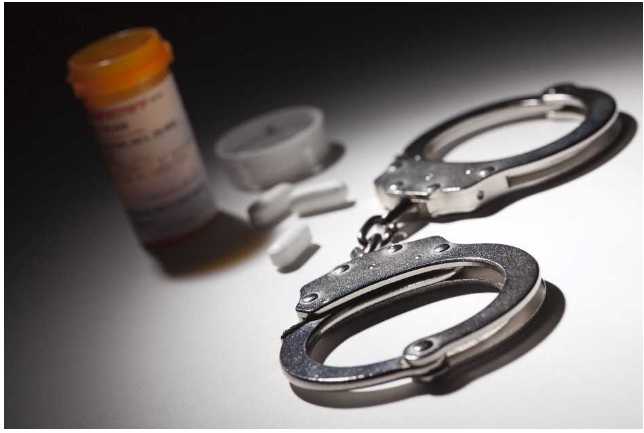
Has a drug-related charge just been brought against you?
Whether it is true or not is of no importance: you have the right to an effective and complete defense prepared by a competent criminal lawyer! Moreover, such a defense is the only thing that can save you from a hefty fine or even jail time.
In knowing this, don’t hesitate to turn to a criminal lawyer with experience in handling drug-related cases. JuriGo can explain EVERYTHING you need to know about offences related to the possession, trafficking, manufacturing, and exportation of drugs.
You will quickly understand the steps to follow to get out of your legal mess and avoid being found guilty of a criminal charge related to drugs.
Have you been charged with a drug-related offence? Follow these steps!
Being charged with a drug-related offense is definitely stressful. But how should you react to a criminal charge against you? You need to find a criminal defense lawyer as soon as possible!
Your criminal defense must be personalized!
Even if the charges are the same from one accused to another, the type of defense must be adapted to the specifics of each case and to the facts surrounding the case. This obviously requires a certain expertise that only experienced lawyers have!
The consequences of a drug-related charge are severe. JuriGo explains the risks you face right here!
Consequences of drug-related offences

In Canada, there are three types of offences: summary indictment offences, criminal offences, and “hybrid” offences. Each infraction comes with a different level of punishment and consequences!
To fully understand the implications of your drug charge, you must understand what a hybrid offence is!
Summary indictment
A charge may be laid summarily where the Criminal Code expressly provides for it. However, summary conviction is only applicable to offences deemed to be "less serious" which also carry more lenient sentences.
Criminal indictment
A criminal charge is brought forward when the offence is of a more serious nature and particularly reprehensible. Consequently, the penalties are much more severe!
And finally, some offences are considered "mixed" or "hybrid"!
A hybrid offence refers to charges that the Criminal Code allows to be laid either summarily or criminally. The criminal and penal prosecutor will decide on the type of indictment and it will have a huge impact on the severity of the sentence that will be imposed!
Many drug offences can be prosecuted by criminal or summary indictment.
Consider the impact that the type of indictment could have on your sentence: you will quickly understand the value of hiring a good defense lawyer!
The type of substance and the consequences of a drug offence!
One more thing you must understand about drug charges is that the nature of the substance will have a big impact on the severity of the sentence.
The Controlled Drugs and Substances Act categorizes drugs into four main categories based on the nature of the prohibited substance!
| CATEGORIES Controlled Drugs and Substances Act | Prohibited substances |
|---|---|
| Schedule I | Cocaine - Morphine - Heroin - Codeine |
| Schedule II | Cannabis - Hashish and other synthetic cannabinoids |
| Schedule III | Hallucinogens - LSD - Magic mushrooms |
| Schedule IV | Calmatives - Valium - Ativan - Xanax and others. (Substances that are sold in pharmacies with a prescription). |
What impact does the type of substance have on your sentence?
Some substances - like narcotics for example - are considered more harmful and, therefore, more reprehensible under criminal law. Schedule I offences containing narcotics, for example, carry harsher penalties than crimes under the other categories.
Thus, the substance you are charged with will have an impact on the consequences and possible penalties, regardless of your specific charge.
Drug Possession - EVERYTHING you need to know!

What constitutes drug possession in Canada?
For an individual to be charged and convicted of the crime of drug possession, three elements must be proven by the prosecutor beyond a reasonable doubt.
1)The substance must be included in Schedule I, II, or III.
-
The accused must know the nature of the substance (Know that he/she possesses the drug).
-
The accused must have control over the substance.
For a possession charge to be substantiated, the accused must have been found with a sufficient quantity of the substance to be measured. Sometimes the amount is deemed insufficient to support an indictment.
Possession for the purpose of trafficking - BEWARE of possible penalties!
| Summary Offence | Criminal offence | |
|---|---|---|
| Schedule I | First Offence: Imprisonment for 6 months and/or a fine of $1,000 Second Offence: Imprisonment for 1 year and/or a fine of $2,000 | Imprisonment for a maximum of 7 years |
| Schedule II | 1st offence: Imprisonment for 6 months And/or a fine of $1,000 2nd offence: Imprisonment for 1 month and/or a fine of $2000 | Imprisonment for a maximum of 5 years less 1 day |
| Schedule III | 1st offence: Imprisonment 6 months and/or a fine of $1,000 2nd offence: Imprisonment for 1 month and/or a fine of $2,000 | Imprisonment for a maximum of 3 years |
Is there a defense to a drug possession charge?
The law only punishes people with a "guilty mind", also known as Mens Rea. This means that a person who does not know that he or she has a prohibited substance will not be convicted of the crime of possession.
The classic example is the person who thinks they are carrying powdered sugar when, in fact, they are carrying narcotics. This is the defense of mistaken identity.
Are you being charged with possession for the purpose of trafficking or trafficking?
The offences of "possession for the purpose of trafficking" and "trafficking of drugs" are distinct, but they both involve the same consequences. In both cases, the Crown will have to prove the elements of the offence beyond a reasonable doubt!
What factors must be proven for you to be found guilty of "possession for the purpose of trafficking"?
-
Possession of a prohibited substance (Schedules I-IV)
-
Knowledge of the nature of the substance
-
Control over the prohibited substance
-
Intent to traffic
What must the Crown prove to convict you of trafficking? The criminal law considers trafficking to be:
-
Selling a prohibited substance
-
Giving away a prohibited substance
-
Transporting/delivering
It is not necessary for the substances to be sold in order for a drug trafficking offence to be justified as trafficking is a much broader concept than sale under the Criminal Code.
Here are the possible consequences of being charged with possession for the purpose of trafficking!
| Summary Infraction | Criminal Infraction | |
|---|---|---|
| Schedule I and Schedule II | not applicable | Life imprisonment BUT** A maximum penalty of 5 years less 1 day if the substance is listed in Schedule II and the quantity is less than 3 kg. |
| Schedule III | Maximum imprisonment of 18 months and/or a fine of $5,000 | Maximum imprisonment of 10 years |
| Schedule IV | Maximum penalty of 1-year imprisonment and/or a fine of $5,000 | Maximum imprisonment of 3 years |
You can also be charged with attempting to traffic or being an accomplice!
In fact, the charge of attempt may be justified if the exchange of the substance in exchange for compensation was aborted but the accused was still about to commit the prohibited act.
Being convicted of trafficking can have serious consequences so it is in your best interest to quickly find a criminal lawyer for your defense.
What constitutes a drug manufacturing charge?

What evidence must be presented for you to be guilty of manufacturing drugs?
A manufacturing charge will be warranted if the accused has obtained, by the manufacture, synthesis, or otherwise, a prohibited substance listed in Schedules I to IV. This offence applies when the accused is charged with manufacturing an illegal substance!
The charge of manufacturing prohibited drugs is strictly a criminal offence!
| Type of Substance | Criminal Offence |
|---|---|
| Schedule I Schedule II | 2 to 3 years of imprisonment 1 year to 18 months of imprisonment |
A charge of producing drugs (other than narcotics) is a hybrid offense!
| Schedule III | Maximum imprisonment of 18 months and/or a fine of $5,000 | Maximum imprisonment of 10 years |
|---|---|---|
| Schedule IV | Maximum imprisonment of 1 year and/or a fine of $5,000 | Maximum imprisonment of 3 years |
As you can see, the severity of the penalties vary depending on the type of substance the accused is charged with manufacturing. Drugs are among the most reprehensible substances and carry the most severe penalties.
Drug importation & export have severe consequences!
What must be proven in a drug importation and export charge?
The charge of importing drugs refers to the act of bringing into the country an illegal substance listed in the schedules of the Controlled Drugs and Substances Act. The accused may be convicted of this crime even if he or she is not carrying the substance as it enters the country.
Exporting is the same as importing but involves taking the substance out of the country. You could also be convicted of possession for the purpose of export. The following elements have to be proven:
-
Possession of an illegal substance
-
Control over the illegal substance
-
Intent to export
Have you been charged with importing or exporting drugs to Canada?
| Summary Indictment | Criminal Indictment | |
|---|---|---|
| Schedules I and II | Not applicable | Maximum of life imprisonment |
| Schedules III and VI | Maximum imprisonment of 18 months | Maximum imprisonment of 10 years |
| Schedules IV and V | Maximum imprisonment of 1 year | Maximum imprisonment of 3 years |
Take note that if you are arrested in another country for attempting to import or export drugs into Canada, you may be subject to the laws and penalties of the foreign country.
What are the possible penalties for a drug charge?
The Criminal Code and the Controlled Drugs and Substances Act provide for a wide range of penalties for drug-related criminal offences. It can be confusing which is why JuriGo has prepared this chart to give you a clear idea of the consequences you may face.
Here is a summary of the possible prison sentences for a drug charge in Quebec!
| Drug-related offences | Minimal prison sentence | Maximum prison sentence |
|---|---|---|
| Drug possession | 6 months and/or a fine of $1,000 | 7 years |
| Possession for the purpose of trafficking | 1 year | Lifetime |
| Importation and exportation of drugs | 1 year | Lifetime |
| Manufacturing of drugs | 1 year | 10 years |
How does a judge decide on a prison sentence in Quebec?
You now understand that judges have a certain amount of latitude in deciding on a prison sentence. Knowing this, how do they apply the sentence for each individual who is found guilty of a crime?
By applying sentencing principles that force them to consider all of the following factors:
-
The seriousness of the offence
-
The principle of proportionality (between the punishment and the crime)
-
The principle of moderation (using imprisonment as a last resort)
-
The principle of harmonization of sentences (similar crimes should receive a similar sentence)
But TAKE NOTE - Some offences have a minimum sentence!
When an offence has a minimum sentence of imprisonment, the judge has no discretion to decide on the sentence: the judge must impose the minimum sentence. In fact, some drug offences have a minimum sentence.
Will you be able to get a discharge to avoid jail time?

At this point, you know that imprisonment and a fine are the two most common penalties imposed when an individual is convicted of a drug-related charge.
But is it possible to obtain a discharge for such an accusation?
A discharge is a sentence provided for in the Criminal Code. It can be conditional or unconditional! With an absolute discharge, the judge recognizes your guilt without imposing a sentence.
When the discharge is conditional, the same result occurs but certain conditions must be respected for a certain period of time in order to benefit from the effects of the discharge.
Are you eligible for a discharge following your drug charge?
A discharge is one of the possible scenarios for a drug charge but several factors must apply for you to be eligible. Your offence must demonstrate a low threshold of seriousness and most importantly, it must not carry a minimum sentence.
Consult with a criminal defense lawyer from the JURIGO network to prepare a strong defense for your drug charges!
Frequently asked questions about drug possession or trafficking charges
Why do you need a criminal defense lawyer?
Because criminal law - particularly drug charges - is a world of many subtleties. Lawyers who work in this field are criminal specialists. You must take advantage of their expertise!
If you are found guilty, how long before you can apply for a pardon?
It depends on the severity of the sentence! However, it is usually between 5 and 10 years after serving your sentence that you are eligible to apply for a pardon. Once the application is submitted, it takes several months to obtain a decision from the Parole Board.
Are you eligible for government legal aid to defend yourself?
Government legal aid is a service available to low-income individuals. At the time of your arrest, you may speak to a legal aid lawyer for free. However, your income will determine your eligibility to avail of free legal aid services.
Find your criminal defense lawyer with JuriGo!
We're not kidding when we talk about the severe consequences that come with a drug charge! A criminal record, a fine, and possible imprisonment await you if you don't take the necessary steps to defend yourself.
JuriGo presents you with a solution that is easier than trying to defend yourself: Find a criminal defense lawyer. Simply contact us by filling out our form and we'll put you in touch with a criminal defense lawyer for free.
Our service is free and allows you to find a lawyer with just a few clicks. Take advantage of this offer and benefit from the expertise of a criminal defense lawyer.